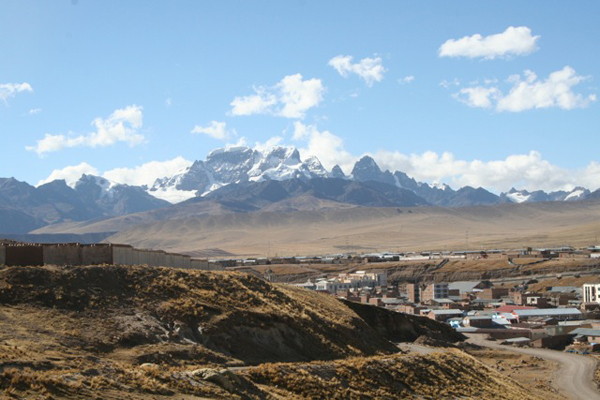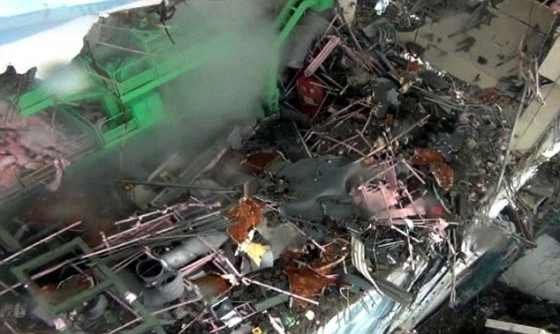By Ron Hart
 Presently the crimes against peace as outlined in the Rome Statute of 2002 under the jurisdiction of the International Criminal Court (ICC) in the Hague, are Genocide, Crimes Against Humanity, War Crimes and Crimes of Aggression. Crimes against nature and all who live in it are not protected in peacetime. The proposed Ecocide Act is the expression of the missing fifth crime against peace, Ecocide.
Presently the crimes against peace as outlined in the Rome Statute of 2002 under the jurisdiction of the International Criminal Court (ICC) in the Hague, are Genocide, Crimes Against Humanity, War Crimes and Crimes of Aggression. Crimes against nature and all who live in it are not protected in peacetime. The proposed Ecocide Act is the expression of the missing fifth crime against peace, Ecocide.
Presently, all non-human nature is regarded simply as property or as a common resource. The protections of corporate personality allow corporate criminals to ravage ecosystems and escape personal criminal prosecution with impunity.
Our present laws are inadequate for the job of protecting the planet. The Ecocide Act is the missing fifth crime against peace. It places trusteeship law superior to property law. ‘I own’ is replaced with ‘I owe.’
What precisely do we owe?
The Ecocide Act places each individual as a trustee for life on Earth. As such, as trustees, we have a legal duty of care-a sacred trust- to protect the well-being of Earth’s inhabitants and uphold the sacredness of life.
In other words, even if it is enormously profitable, we can no longer trash the planet. A healthy economy depends directly on a healthy environment. The Ecocide Act is a gateway to the well-being of the whole Earth community.
This article by the brilliant writer Phil Rockstroh, goes to the heart of the matter: when we talk about ecocide, we are dealing with issue of our soul’s ability “to rise up and resist the forces that lay siege to one’s innate humanity.”
We need the pass the Ecocide Act.
Ecocide and the Soul of a Nation
At the front of the political madness enveloping the United States are anti-government, anti-science extremists who reject evidence of global warming and block any response to this existential threat. But the disconnect between environmental destruction and today’s humanity goes deeper, says Phil Rockstroh.
By Phil Rockstroh
The reality of and the outward toll inflicted by greenhouse-gas engendered Climate Change is clearly evident (to all but the corrupt and devoutly ignorant) e.g. increasingly destructive and deadly tornadoes and hurricanes, destruction of marine life, severe droughts and rapacious wild fires — landscapes of death, scattered debris and shattered lives.
But what are the psychical effects of chronic denial, noxious indifference and compulsive prevarication as related to a matter as all-encompassing and crucial as our relationship with the climate of our planet?

Our current catastrophe of estrangement, termed “our way of life,” we experience as a denuding of resonance, meaning and purpose, as a prevailing sense of emptiness and unease, as a craving for distraction, as an inchoate longing for change and transformation, yet a diffidence to the point of paralysis insofar as any means to expedite longing and libido into societal-altering action.
Estrangement from nature is estrangement from the landscape of the soul. The cosmos and the soul carry the same blueprint; the forces were forged in the same fires of infinity. In matters, galactic and quotidian, there is not a form that rises, waxes and wanes in nature that does not have an analog in our human physicality, faculties and endeavors.
To turn a blind eye to the natural world, as we have done, translates into psychical ecocide. Perception is degraded. Language truncated. Life becomes dispossessed of purpose and meaning. Apropos, the rise and banal persistence of: The United States of Whatever.
Under these circumstances “whatever” translates into, inner and extant, deadly super storms, ecocide and desertification (including and related to the desertification of language). As we decimate the earth’s biodiversity, we diminish our lexicon. Our thoughts cannot take wing; our imaginings cannot take root and flower; our passions cannot flow; our putrefying pathologies cannot be composted.
Divested of an eloquence of thought, expression and action — devoid of a deep connection to and denied of constant dialog with earth, sky, wind and water — we cannot retain enough humanity to remain viable as a species.
By evincing a state of mind that is indifferent to the wanton destruction of our planet’s interdependent web of biodiversity, we lay waste, on a personal and collective basis, to the evolving, vital ecosystem of the psyche, thereby creating a bland, dismal, corporate monoculture, that is both manifest and internalized.
The emptiness of life in the neoliberal corporate/consumer state has grown increasingly unbearable; the carnage inflicted on our planet is indefensible; and its present trajectory is tragically untenable.
Our last, best option is a top-to-bottom re-visioning. In diametric opposition, at paradigm’s end, we are witness to the deranged marriage of the profligate and the parsimonious. The covert offshore bank accounts of the greed-maddened hyper-wealthy and the teeming landfill are dismal emblems of late-capitalist madness.
The moribund mythos (manic in the face of its undoing) of “productivity” exists at the core of the capitalist delusion. Discussing the matter with a capitalist true-believer is like talking to an obsessive lunatic about his vast collection of string and his compulsive hoarding of rubber bands and bread ties.
Behind the situation is the crackpot pragmatism of state capitalism, e.g., that all things must have a practical purpose in order that they be exploited for maximum productivity as a means of generating obscene sums of wealth for a tiny (loose knit) cabal of global economic elite. (Yet the motives driving the mania of a system geared to perpetual growth, conveniently, are omitted from almost all mainstream discussions of the matter.)
One’s humanity is restored by tears and laughter … by the marriage of eros and empathy. We must grieve for the harm we have wrought and guffaw at our egoist folly; we must shed copious tears and be seized by outright, sustained laughter. Self-awareness is tantamount to salvation, and an experience akin to rebirth is bestowed by the apprehension of the ridiculous nature of vanity and empty striving.
Then and only then, do conditions become favorable for restoration and re-visioning. Thus, grace falls as a forgiving rain.
In May of last year, my family laid my father to rest. Shortly after my return to New York City from Georgia, we received the news that my wife, Angela, was pregnant. Thus, fate fitted me with the garments of fatherhood. The clothing of the son sent to the consignment shop, I stood in awe, and with more than a little trepidation, before unfolding circumstance.
Grief and longing mingled and merged within me. At night, I dreamed of friends from my youth who have died over the passing years. With increasing frequency, during this past year, I have had reoccurring dreams involving one post-adolescent friendship, in particular, the period surrounding the dawning of our awkward and painful puberty.
Chuck was redheaded, freckled, bespectacled, bully-bedeviled — a bright, sensitive, wounded soul, who would later succumb to the ravages of alcoholism. We shared an enthusiasm for books. We read Tolkien, of course, but also Camus, Celine, even Cervantes (having an ardor for books was a quixotic propensity in those days in the Deep South, and I suspect it still is).
We collected tropical fish — their bright, color-emblazoned markings stood in vivid contrast to the desolate, laboring-class milieu that was foisted as our fate.
“You two, heads-in-the-clouds, noses-in-books losers will have to face the real world one day, and, I’ll tell you what, that will be one sorry-ass sight,” some figure of grim authority would bandy at us.
“Do you understand what I’m saying, boy?”
“Yes.”
“Yes, what?”
“Yes, I understand.”
“You, show some respect for your elders, by answering, ‘Yes, sir.’ Do you understand me?”
“Yes,” I replied, earnestly … having grown obtuse by the anxiety inflicted by attempting to appear submissive to the demands of unreasonable power.
“Look here, smart-ass. I’ve about had my fill of your insolence.”
Nonplussed. I would have said anything to end the encounter. But some life-bestowing daemon would stir within … most likely, it was the same inner, trickster entity responsible for occluding my ability to comprehend what this authoritarian jerk-rocket was demanding of me.
“What is your problem, boy? Just what kind of a stupid animal are you?” — an inquiry that provided an opening for the daemon.
“I was raised by raccoons, sir.”
“You … what?”
“My parents were killed by your Klansman relatives. I escaped into the woods. And I was adopted by nocturnal, fur-bearing mammals. I’m untrainable. I scurry through the darkness. I bite when cornered. My destiny has been forged by fate. I am Raccoon Boy, enemy of racists and power mad freaks.
“I have to confess, it is my reverence for my poor, slain parents that will not allow me to address you with deference nor grant you respect, as you have demanded. In short, I can either submit to calling you sir or I can betray my destiny. But I cannot do both.
“Therefore, do with me what you will. But you will never again sleep easy … for my raccoon brothers and sisters will track you down and you will wish we had never met. You will never again hear a rustling in the underbrush and not be stricken with the knowledge that you are in the presence of your doom.”
These sorts of responses would often end such encounters. In the South, in those days, crazy people were given a great deal of latitude.
At present, in my nighttime dreams of the time, I often find myself in the company of Chuck at the intersection of two major streets that cut through the area near our school, North Decatur and Clairmont Road. In waking life, Chuck and I, in order to avoid confrontations with neighborhood boys who viewed us as “hippie faggots” did not venture beyond this demarcation point. The landscape beyond was fraught with peril.
Even in adult life, Chuck never ventured far from home, and when he did, he was fortified with drink. Many times, at transition points in my life, my soul summons dreams of Chuck and me, our hearts … filled with yearning — yet we stand diffident, to the point of paralysis, at the intersection of North Decatur and Clairmont Road.
The world outside of the boundaries decreed by outward circumstance and imposed by one’s fears is fraught with uncertainty to the degree that it is veiled in mystery. There are legions of authoritarian bastards and mindless bullies about. Regardless, one must venture forth. One does have allies — the spirit of departed friends and inner daemons with quicksilver wit et al.
The future is always uncertain. But Raccoon Boy will be there to meet what comes.
Climate Change denial. Political duopoly. The corrosive effect of empire, maintained by militarism, on a foundering republic. The noxious food manufactured and consumed under corporate state oligarchy.
The catastrophic consequences that the demise of the public commons has on the human personality, in combination with the societal repercussions of a populace that receives the vast majority of information from within the bubble of an enveloping media hologram attendant to a grid of authoritarianism that determines and degrades the criteria of almost all experience in the corporate state.
Yet these unhinged conventionalities do not create a catalyst to action, but inflict angst, ennui and anomie. How can this be? By what means does passivity before and complicity in one’s own debasement become normalized? By small bribes as reward for compliance and severe consequences for attempts at defiance … that is how. This state of affairs serves as the sine qua non for any reign of oppression and cultural track towards catastrophe.
If an individual is coerced into conformity by his/her livelihood being threatened, even by implicit means, angst will be experienced. As a result, one will attempt to find a means of relieving the incurred sense of unease. And this is where the small bribes, that serve as palliatives to ease angst, come in.
If challenging (seemingly) implacable power results in a termination of employment or a stint of incarceration, of which, a record will follow one through life, most will find the repercussions of defying authority unbearable. One’s image of oneself would be endangered, or so it seems, by such a circumstance.
Yet what are the consequences of submission, in regard to one’s sense of self? Because, in order to submit, an individual must shunt from consciousness the painful implications of one’s predicament, a general diminution of perception occurs. Thus, for example, Climate Change denial is but part and parcel of a larger, enforced cosmology of deception, both personal and societal in origin.
At our present rate, the oceans and seas of the world will be dead in less than half a century. Humankind has become a mindless, devouring leviathan. Slice open our collective belly and the ill-gotten bounty of our besieged earth will be disgorged.
What is the music of the spheres? asked Schopenhauer. “Munch. Munch. Munch.”
Yet, tone-deaf, and rapacious, we are devouring the world in a manner that is closer in form to a banal pop song; a pestilence of ditties, resonant of the landfill, is descending in the form of consumerist locust.
When our days are denuded of depth, meaning and inspired purpose, we gorge our bellies in an attempt to alleviate the ache of emptiness. The operatives of the corporate/commercial hologram have induced us to devour the planet like a serving of Hot Pockets. Yet the emptiness within only grows.
We have been enticed to believe that remedy will be found in more of what caused our misery in the first place. Relief, even redemption, will be found in yet MORE. Thus, we come upon the insatiable leviathan that glides within. We are lodged in the monster’s belly, wherein we mistake his impersonal appetite for our own. In this way, the consumer is consumed by the collective.
How does one sate a force that is insatiable? By seizing back one’s unique identity. The angel whose name is Enough arrives within one’s reclaimed human voice. It comes down to this: ecology or catastrophe.
Because one’s humanity is formed and rounded by one’s limits, we must be open to the infinity of forms that is the ecosystem of the soul but not allow vanity to attempt to claim dominion over what is ungovernable. Thus, one regains one’s soul by speaking in a human voice.
Yes, it is tinged with universal fire, but, to we human beings, its home is the hearth of the human heart, within which empty appetite is transmuted into the yearnings of the heart; thereby, empty motion becomes emotion; passion deepens into compassion.
The matter does not involve searching for redemption nor striving for perfection; instead, it involves awakening … an awakening to the vast multiverse of the dreaming heart. Therein, the oceans are teeming with vivid life.
And where there exists the implicate order of the soul there exists the wherewithal to rise up and resist the forces that lay siege to one’s innate humanity.





 As explained above, AECL, as a subsidiary of SNC-Lavalin, has been sanctioned by the World Bank and CIDA and is ineligible for project funding for 10 years because of international fraud. Closer to home, SNC-Lavalin continues to battle
As explained above, AECL, as a subsidiary of SNC-Lavalin, has been sanctioned by the World Bank and CIDA and is ineligible for project funding for 10 years because of international fraud. Closer to home, SNC-Lavalin continues to battle  The renewable industries (particularly wind and solar) have seen tremendous pent-up demand that is clamoring for access to more grid space: the
The renewable industries (particularly wind and solar) have seen tremendous pent-up demand that is clamoring for access to more grid space: the 
 And if the revised Long Term Energy Plan determines the Darlington Refurbishment is somehow a responsible investment, then the contract for this work should be awarded through an open and transparent bidding process, not another rich and exclusive deal to SNC-Lavalin, with firm prices available for public review and comment.
And if the revised Long Term Energy Plan determines the Darlington Refurbishment is somehow a responsible investment, then the contract for this work should be awarded through an open and transparent bidding process, not another rich and exclusive deal to SNC-Lavalin, with firm prices available for public review and comment.
 Derek Satnik is a LEED® Accredited Professional Engineer, and internationally awarded expert in sustainable housing and renewable energy systems. He lives in Kitchener at the Ontario Green Home (
Derek Satnik is a LEED® Accredited Professional Engineer, and internationally awarded expert in sustainable housing and renewable energy systems. He lives in Kitchener at the Ontario Green Home (




















